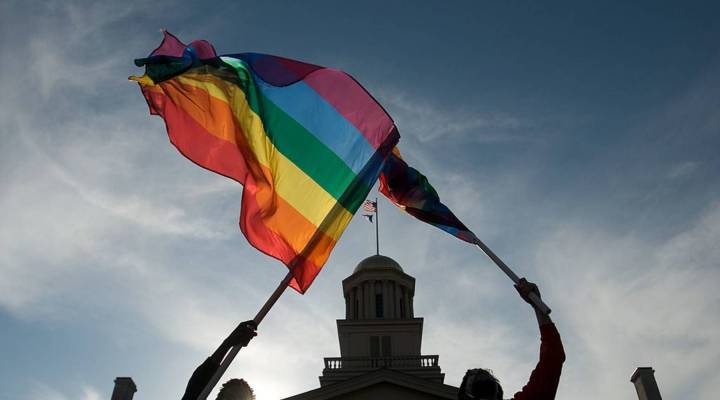
LGBTQ advocates ask why questions left off Census survey

What’s your sexual orientation and gender identity? The Census Bureau was considering asking that on upcoming surveys, but not any more. Advocates for lesbian, gay, bisexual, transgender and questioning (LGBTQ) people are concerned about the change.
That’s because the U.S. lacks simple information about the LGBTQ community. How big is it? What is the average income level, life expectancy, or unemployment rate? Without data, policymakers can ignore you and pretend you don’t exist, said Rebecca Rolfe, director of the San Francisco LGBT Center.
“We need to be visible,” Rolfe said. “I think we need to be clear that there are LGBTQ people everywhere in every state, in every county through the United States.”
| The push to have better workplace protections for the LGBT community |
| Mapping North Carolina’s trans-friendly bathrooms |
Questions about sexual orientation and gender identity would connect the LGBTQ community to all the rich data of the census. Under the Obama administration, the Census Bureau began considering these inquiries. When contacted about the decision not to ask these questions now, the Census referred to a statement that asserts there is “no federal data need” for them. Similar questions have disappeared from other federal surveys.
This is not just about visibility, also about but money, said Kenneth Prewitt, who directed the Census Bureau in the 2000s. “What drives basic fairness is numbers,” he explained.
Prewitt said $4 billion in federal funds are allocated based on census data, and it indirectly touches many budget decisions. If you aren’t counted, it’s harder to advocate for your share. But Prewitt said you can’t blame the Census Bureau for the policy change, because the organization is apolitical and takes directives from the administration.
“It’s not like the Census Bureau sits around the table and says ‘Oh what should we ask the American public today?’” Prewitt said. “That just doesn’t happen.”
Peter Skerry is a professor of political science at Boston College. He said that while the Census Bureau wants to appear neutral and above the fray, its work is inherently political. “To say that it’s simply a non-partisan, non-political agency ignores that it has highly political functions,” Skerry said.
Groups fight each other and lobby just to be counted. “The space on a survey is limited,” Skerry said. “There’s only so many questions you can ask about so many things.”
One libertarian publication, Reason.org, said there are good reasons for not including new questions about sexual orientation and gender identity. It said that the government has used personal data against minority groups in the past.
It takes years for the Census Bureau to research, test, and add new questions, which is why LGBTQ advocates say this represents a big setback. It could now be a long time before its community get counted.
There’s a lot happening in the world. Through it all, Marketplace is here for you.
You rely on Marketplace to break down the world’s events and tell you how it affects you in a fact-based, approachable way. We rely on your financial support to keep making that possible.
Your donation today powers the independent journalism that you rely on. For just $5/month, you can help sustain Marketplace so we can keep reporting on the things that matter to you.


















